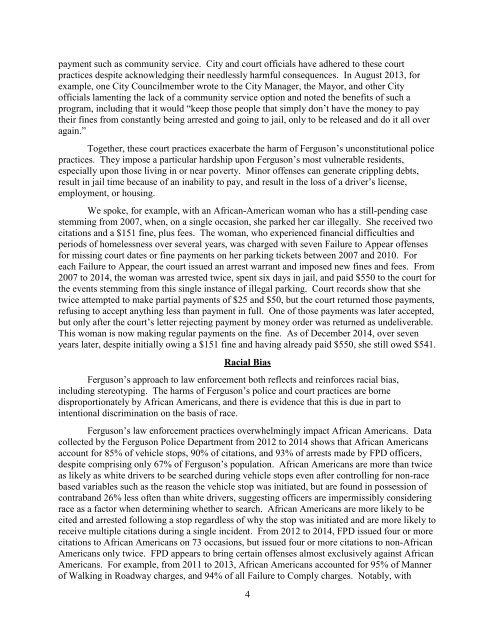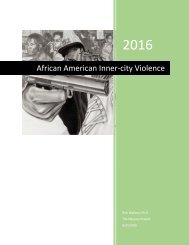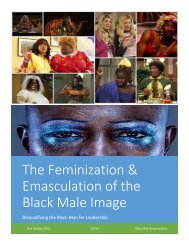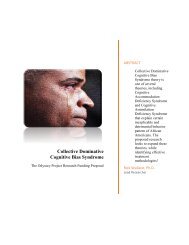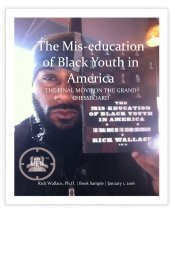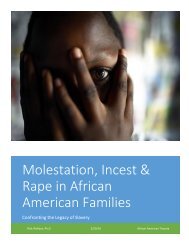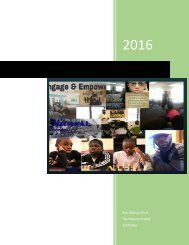U.S. Justice Department Report on the Ferguson Police Department
Ferguson’s law enforcement practices are shaped by the City’s focus on revenue rather than by public safety needs. This emphasis on revenue has compromised the institutional character of Ferguson’s police department, contributing to a pattern of unconstitutional policing, and has also shaped its municipal court, leading to procedures that raise due process concerns and inflict unnecessary harm on members of the Ferguson community.
Ferguson’s law enforcement practices are shaped by the City’s focus on revenue rather than by public safety needs. This emphasis on revenue has compromised the institutional character of Ferguson’s police department, contributing to a pattern of unconstitutional policing, and has also shaped its municipal court, leading to procedures that raise due process concerns and inflict unnecessary harm on members of the Ferguson community.
You also want an ePaper? Increase the reach of your titles
YUMPU automatically turns print PDFs into web optimized ePapers that Google loves.
payment such as community service. City and court officials have adhered to <strong>the</strong>se court<br />
practices despite acknowledging <strong>the</strong>ir needlessly harmful c<strong>on</strong>sequences. In August 2013, for<br />
example, <strong>on</strong>e City Councilmember wrote to <strong>the</strong> City Manager, <strong>the</strong> Mayor, and o<strong>the</strong>r City<br />
officials lamenting <strong>the</strong> lack of a community service opti<strong>on</strong> and noted <strong>the</strong> benefits of such a<br />
program, including that it would “keep those people that simply d<strong>on</strong>’t have <strong>the</strong> m<strong>on</strong>ey to pay<br />
<strong>the</strong>ir fines from c<strong>on</strong>stantly being arrested and going to jail, <strong>on</strong>ly to be released and do it all over<br />
again.”<br />
Toge<strong>the</strong>r, <strong>the</strong>se court practices exacerbate <strong>the</strong> harm of Fergus<strong>on</strong>’s unc<strong>on</strong>stituti<strong>on</strong>al police<br />
practices. They impose a particular hardship up<strong>on</strong> Fergus<strong>on</strong>’s most vulnerable residents,<br />
especially up<strong>on</strong> those living in or near poverty. Minor offenses can generate crippling debts,<br />
result in jail time because of an inability to pay, and result in <strong>the</strong> loss of a driver’s license,<br />
employment, or housing.<br />
We spoke, for example, with an African-American woman who has a still-pending case<br />
stemming from 2007, when, <strong>on</strong> a single occasi<strong>on</strong>, she parked her car illegally. She received two<br />
citati<strong>on</strong>s and a $151 fine, plus fees. The woman, who experienced financial difficulties and<br />
periods of homelessness over several years, was charged with seven Failure to Appear offenses<br />
for missing court dates or fine payments <strong>on</strong> her parking tickets between 2007 and 2010. For<br />
each Failure to Appear, <strong>the</strong> court issued an arrest warrant and imposed new fines and fees. From<br />
2007 to 2014, <strong>the</strong> woman was arrested twice, spent six days in jail, and paid $550 to <strong>the</strong> court for<br />
<strong>the</strong> events stemming from this single instance of illegal parking. Court records show that she<br />
twice attempted to make partial payments of $25 and $50, but <strong>the</strong> court returned those payments,<br />
refusing to accept anything less than payment in full. One of those payments was later accepted,<br />
but <strong>on</strong>ly after <strong>the</strong> court’s letter rejecting payment by m<strong>on</strong>ey order was returned as undeliverable.<br />
This woman is now making regular payments <strong>on</strong> <strong>the</strong> fine. As of December 2014, over seven<br />
years later, despite initially owing a $151 fine and having already paid $550, she still owed $541.<br />
Racial Bias<br />
Fergus<strong>on</strong>’s approach to law enforcement both reflects and reinforces racial bias,<br />
including stereotyping. The harms of Fergus<strong>on</strong>’s police and court practices are borne<br />
disproporti<strong>on</strong>ately by African Americans, and <strong>the</strong>re is evidence that this is due in part to<br />
intenti<strong>on</strong>al discriminati<strong>on</strong> <strong>on</strong> <strong>the</strong> basis of race.<br />
Fergus<strong>on</strong>’s law enforcement practices overwhelmingly impact African Americans. Data<br />
collected by <strong>the</strong> Fergus<strong>on</strong> <strong>Police</strong> <str<strong>on</strong>g>Department</str<strong>on</strong>g> from 2012 to 2014 shows that African Americans<br />
account for 85% of vehicle stops, 90% of citati<strong>on</strong>s, and 93% of arrests made by FPD officers,<br />
despite comprising <strong>on</strong>ly 67% of Fergus<strong>on</strong>’s populati<strong>on</strong>. African Americans are more than twice<br />
as likely as white drivers to be searched during vehicle stops even after c<strong>on</strong>trolling for n<strong>on</strong>-race<br />
based variables such as <strong>the</strong> reas<strong>on</strong> <strong>the</strong> vehicle stop was initiated, but are found in possessi<strong>on</strong> of<br />
c<strong>on</strong>traband 26% less often than white drivers, suggesting officers are impermissibly c<strong>on</strong>sidering<br />
race as a factor when determining whe<strong>the</strong>r to search. African Americans are more likely to be<br />
cited and arrested following a stop regardless of why <strong>the</strong> stop was initiated and are more likely to<br />
receive multiple citati<strong>on</strong>s during a single incident. From 2012 to 2014, FPD issued four or more<br />
citati<strong>on</strong>s to African Americans <strong>on</strong> 73 occasi<strong>on</strong>s, but issued four or more citati<strong>on</strong>s to n<strong>on</strong>-African<br />
Americans <strong>on</strong>ly twice. FPD appears to bring certain offenses almost exclusively against African<br />
Americans. For example, from 2011 to 2013, African Americans accounted for 95% of Manner<br />
of Walking in Roadway charges, and 94% of all Failure to Comply charges. Notably, with<br />
4


